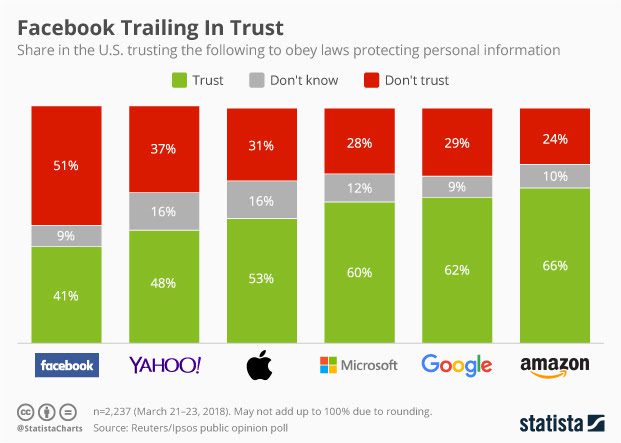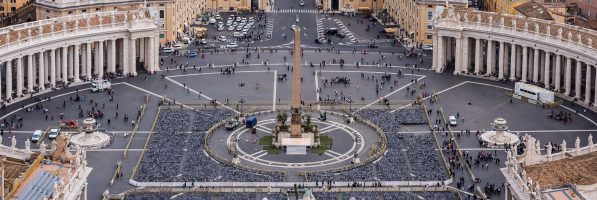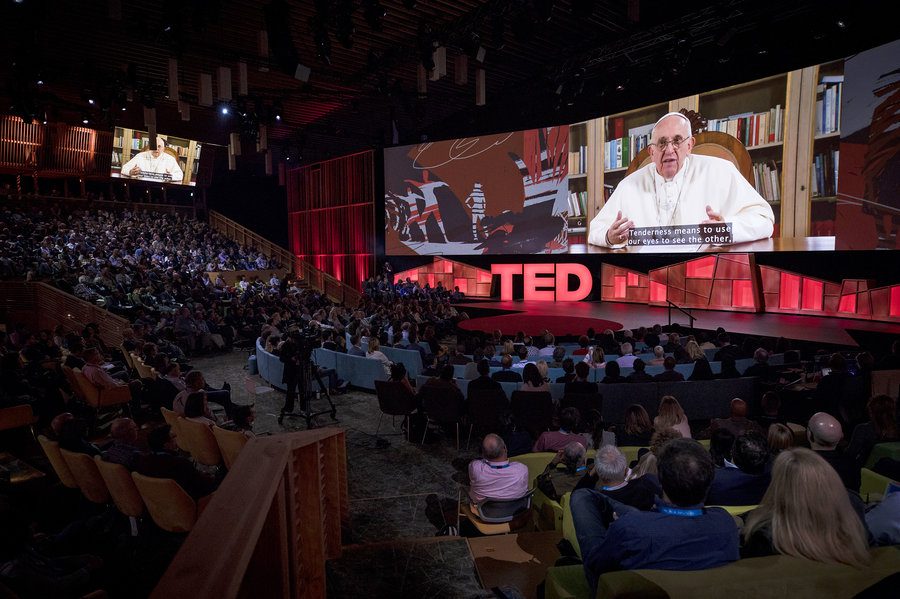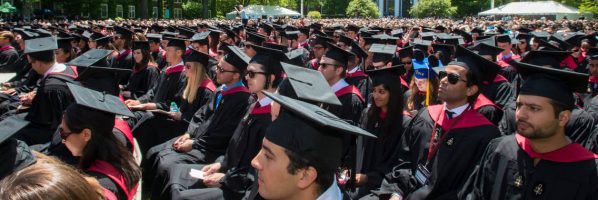What They’re Saying: The Facebook Fallout

It seems puzzling to say a company that is worth nearly half a trillion dollars is venturing somewhere near zero degrees Kelvin, but if you were only reading headlines this week you’d get the sense that Facebook isn’t looking so hot.
Since the break of the Cambridge Analytica scandal, the tech giant lost an estimated $100 billion USD in value, and its beleaguered founder Mark Zuckerberg lost an estimated $14 billion of his own worth. Fortunately for him, according to CNN, he’s still worth over $60 billion so he can easily afford more mayonnaise and butter sandwiches.
But the fallout is more than monetary. Trust in the social media company is at a critical low point, according to Statista data.

Janina Conboye at the Financial Times recently asked how the company may go about repairing its own image in “The MBA view: can Facebook fix its reputation?,” speaking with numerous business school faculty members, including London Business School‘s Jill Schlechtweg, who plainly says, “It is worth wondering whether Facebook can regain credibility at all. Arguably Mark Zuckerberg has evaded responsibility for the social costs of social media addiction, the proliferation of fake news, and now leaks of personal data for political ends.”
Check out how other business schools and industry experts are reacting the ongoing Facebook story below.
What @facebook knows about you apparently includes data about phone calls and messages. The revelation could make Facebook’s huge data scandal hurt more than ever. https://t.co/jActrbEB5i
— MIT Tech Review (@techreview) March 27, 2018
PSA: “Harvard Business School Prof. Shoshana Zuboff calls it “surveillance capitalism.” And as creepy as Facebook is turning out to be, the entire industry is far creepier. It has existed in secret far too long…” https://t.co/vSPlAyWnzu
— Mitchell Schneider (@Mitski) March 27, 2018
What Cambridge Analytica is accused of doing, Facebook and Silicon Valley giants like Google do every day, indeed, every minute we’re logged on. – https://t.co/8O9730vddo
— Mark Schaefer (@markwschaefer) March 29, 2018
In the wake of the Cambridge Analytica scandal, Apple is making their position clear on privacy. https://t.co/OLIl5ihtby
— FOX MBA & MS (@FoxMBA) March 28, 2018
.@profgalloway weighs in on #Facebook‘s handling of the Cambridge Analytica scandal via @barronsonline https://t.co/6zWqfAa3nk
— NYU Stern (@NYUStern) March 28, 2018
What They’re Saying: Business Schools Talk About Cambridge Analytica

Less than a week after Christopher Wylie, the whistle-blower in the ongoing Cambridge Analytica controversy, helped reveal the “dirty tricks” the data mining firm used to help swing elections in North America, Europe, and Africa—including the 2016 U.S. general election—business schools are reacting to the dynamic story.
In short, UK television outlet Channel 4 News filmed several Cambridge Analytica members in an undercover operation, in which they revealed numerous strategies, including: soliciting fake bribes, hiring prostitutes to seduce potential candidates in elections, and more. Company chief executive Alexander Nix was also filmed in the video, which you can watch here, boasted the company’s outreach methods on social media, saying: “It sounds a dreadful thing to say, but these are things that don’t necessarily need to be true as long as they’re believed.”
Another member of the Cambridge Analytica team also argued that they constructed President Donald Trump’s popular “crooked Hillary” campaign slogan from 2016.
Further, the controversy revealed how the company pilfered upwards of “50 million” Facebook profiles, most of which came without consent. Facebook and its founder Mark Zuckerberg played silent on the ongoing story up until March 21, plainly saying in a CNN interview “I’m really sorry that this happened.”
“Aleksandr Kogan, the data scientist who passed along data to SCL Group and its affiliate Cambridge Analytica, built a Facebook app that drew data from users and their friends in 2013. He was allowed access to a broad range of data at the time.
Though Kogan’s data was properly obtained, he breached Facebook’s policy when he shared that information with a third party, Facebook has said. When Facebook learned about the information being shared, it asked Cambridge Analytica to destroy the data. Cambridge said it had.”
Wylie notes that Cambridge Analytica probably never destroyed that data, inevitably leading towards the company’s involvement in the 2016 election. Several of the nation’s most prominent business schools talked about the story on Twitter, which you can read below.
André Spicer, Professor of Organisational Behaviour, on Cambridge Analytica and the possibility of tech companies being forced to expand regulations on privacy and social responsibility.
Read André’s comments: https://t.co/O5IAlUTD5t#cambridgeanalytica#cassbusinessschoolpic.twitter.com/GWv95RUIMc
— Cass Business School (@cassbusiness) March 21, 2018
“The really big issue is if regulators start questioning the business model of tech firms. Currently, consumers give away their data in exchange for free services, but what if regulators start putting a price on people’s data?” –
Cass Business Professor André Spicer
Q&A with @cyberlawclinic‘s @vivekdotca about Facebook and Cambridge Analytica, U.S. privacy protections, and the regulation of the tech industry https://t.co/LPKwwSKSXw
— Harvard University (@Harvard) March 22, 2018
The head of the European Parliament announced on Monday that the EU will investigate whether the data of more than 50 million Facebook users were misused when it was accessed by Cambridge Analytica! https://t.co/q946Hed417
— FOX MBA & MS (@FoxMBA) March 22, 2018
Cambridge Analytica said it’s suspending its CEO immediately and is launching an independent investigation into allegations it misused data on millions of Facebook users. https://t.co/EKeXiuHeQF
— MIT Tech Review (@techreview) March 21, 2018
U.S. News Reveals Sneak Peek of Its 2019 Business School Rankings

With just over a week before U.S. News & World Report reveals its eagerly-anticipated 2019 best business school rankings, the publication offered a sneak peek of the business schools that managed to earn spots within the top 10.
Unsurprisingly, the top 10 of the 2019 rankings resembles the publication’s 2018 edition, with nine out of the top 10 schools nearing the top of the annual list. The lone ranking variation from 2018 to 2019 will be the University of Michigan Stephen M. Ross School of Business, which came in 11th in the previous year.
The top ten business schools for the 2019 U.S. News rankings are as follows (unordered):
- The Wharton School at the University of Pennsylvania
- Harvard Business School
- The Booth School of Business at the University of Chicago
- The Kellogg School of Management at Northwestern University
- The Ross School of Business at the University of Michigan
- The Tuck School of Business at Dartmouth University
- The Sloan School of Management at MIT
- The Stanford Graduate School of Business
- University of California—Berkeley (Haas)
The one school left out of the newest rankings from the previous edition was the Yale School of Management.
The publication will release the full list of the 2019 best business school rankings will officially arrive on March 20, 2018. Stay tuned for more updates on the rankings on MetroMBA.
MIT Students Heading to the Vatican, and More – Boston News

Let’s explore some of the most interesting stories that have emerged from Boston business schools this week.
MIT Students Heading to Rome for First Ever Vatican Hackathon – MIT Newsroom
The first of its kind VHacks will take place in Vatican City from March 8-11, bringing in 120 students from various universities around the world to the city-state of the Roman Catholic Church.
“This is not just for the church,” said Sophie Liao, MIT Sloan MBA ’18, in an interview with Meredith Somers from the MIT Newsroom. “This is more about breaking boundaries. Everyone is a migrant, everyone should be involved in this discussion no matter what country they come from.”
“While this is the first event of its kind at Vatican City, using technology to address more than just science isn’t a new thing for the sovereign state’s most famous resident. In a TED Talk last year, Pope Francis suggested how ‘wonderful it would be if the growth of scientific and technological innovation would come along with more equality and social inclusion.'”

Pope Francis made a surprise Ted Talk in 2017, discussing the importance of humility / Photo via Ryan Lash, TED
You can read more about the upcoming VHacks event in Vatican City here.
Sawyer Introduces New Master’s in Marketing – Sawyer Business School
The Sawyer Business School at Suffolk University has announced its new Master of Science in Marketing degree, which prepares students to “approach complex marketing problems, analyze information, and develop high-quality strategic and tactical solutions.”
“Most master’s-level programs in marketing give the qualitative tools pretty short shrift,” says Professor Elizabeth Wilson, chair of the Department of Marketing. “But knowing how to do that kind of research and understanding the whole spectrum of social science research methods is something every employer will value.”

Product management is one of the three concentrations offered in the new Master’s of Marketing program at Suffolk / Photo via nbbj
Three concentrations will be offered as part of the new Master’s program, including: product management, global marketing, and market research and customer insights.
“’I’m excited to see the new MS in Marketing program. The marketing landscape is constantly evolving, and the way brands need to talk to their customers is evolving as well,’ says Victor Davidson, MBA ’12, senior vice president of analytics at SavingStar. ‘The new degree program will empower students to stay on the forefront of these changes and position themselves as top marketers.’”
You can read more about the MSM here.
How News Coverage is Impacting ExxonMobil’s Social Responsibility – Simmons School of Management
Simmons School of Management professor Edward Vieira recently co-authored a study that analyzed ExxonMobil’s corporate social responsibility messages over a 12-year period, from 2002-03, to “determine if there was a relationship between news coverage and subsequent CSR efforts.”
“Corporations that don’t live up to stakeholder expectations may experience a decrease in credibility, reputation, and legitimacy. It’s beneficial for an organization to consistently communicate its CSR actions as well as address culturally relevant events. Therefore, it’s logical that as the world’s fourth largest oil producer, ExxonMobil’s CEO’s letters delivered CSR messages that focused on major external events.”
Read more about Professor Vieira’s research here.
What are the Greenest Business Schools in the U.S.?

Earlier this month, the Global Hub at Northwestern’s Kellogg School of Management earned LEED (Leadership in Energy and Environmental Design) Platinum certification, becoming only the second building on the Northwestern campus to earn the U.S. Green Building Council’s highest green building rating.
The 415,000-square-foot Global Hub, which opened in March 2017, was designed with a low carbon footprint in mind. It is the largest of Northwestern’s 12 LEED-certified buildings. “Achieving LEED Platinum certification for the Global Hub underscores Kellogg’s strong commitment to sustainability,” Kellogg Chief Operating Officer William Garrett said in a press release. “A world-class facility demands world-class practices, and the Global Hub checks all of the boxes: It minimizes its carbon footprint, is comfortable and healthy for its occupants, and encourages collaboration and a sense of community.”
The building is a marvel of modern architecture and design. It taps into geothermal energy systems underneath the ground for efficient heating and cooling and uses nearly 6,000 fixtures of LED lighting to reduce energy use. The building also has an advanced ventilation system to circulate fresh ar and uses daylight sensors to minimize the need for artificial lighting.
Overall, the Global Hub earned 85 out of a possible 110 points on the LEED scale, including:
- 26 out of 35 points for energy and atmosphere,
- 7 out of 14 points for materials and resources,
- 8 out of 10 points for water efficiency,
- 23 out of 26 points for location,
- 11 out of 15 points for indoor environmental quality, and
- 10 out of 10 points for the design process and regional priority categories.
“We are proud to have successfully integrated best-in-class sustainability with a stunning architectural design, proving that excellence in design and sustainability are not mutually exclusive,” said Bonnie Humphrey, director of design for facilities.
Of course, Kellogg isn’t the only business school to embrace environmentally conscious building practices for its new facilities. It’s a practice we’re seeing across the board at various top schools.
For example, Harvard Business School has a Sustainability Plan that was adopted in October 2014 to reduce greenhouse gases, improve energy efficiency, reduce water usage and waste, and more. Already, the university has cut its greenhouse gas emissions by 49 percent, its energy use by 33 percent, and its water use by four percent.
MIT Sloan School of Management’s newest building, the Joan and William A Porter 1967 Center for Management Education, also known as E62, was designed with energy efficiency in mind as well. Among its sustainable features are light-sensitive window shades, a green roof, and an irrigation system that minimizes water use by responding to changes in weather.
And not to be left out, UC Berkeley’s Haas School of Business designed its recently constructed Chou Hall to become the nation’s greenest academic building. In addition to LEED Platinum certification, Chou Hall was designed to attain WELL certification, an added accolade given to buildings that promote user health and well-being. Toward this goal, its design includes rainwater cisterns and 24,300 square feet of exterior windows in addition to efficient heating, cooling, and lighting systems.
This article has been edited and republished with permissions from our sister site, Clear Admit.
Comparing The U.S. News Full-Time and Online MBA Rankings

When it comes to business school rankings, U.S. News & World Report issues one of the most comprehensive annual lists. The annual rankings includes separate lists for the “Best Business Schools” and the “Best Online MBA Programs,” but deciding which format is right for you can still be tricky. Continue reading…
